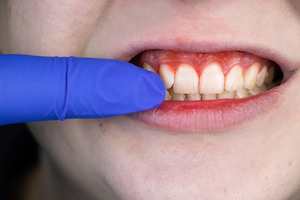
Gingivitis is the first stage of gum disease. It may not seem like a major issue at first, but if it is left alone for too long, it can eventually turn into a grave threat to your oral health. As such, it’s important to be able to recognize the warning signs of gingivitis. Below is a brief look at the symptoms linked to early gum disease as well as steps you can take to have the problem diagnosed and treated.
Common Symptoms of Gingivitis
It’s worth noting that sometimes gingivitis doesn’t have obvious symptoms at first, so you may not realize that you have it until it has already grown worse. That being said, there are a number of warning signs that are associated with gingivitis:
- You may notice that your gums are unusually swollen or puffy.
- Your gums may seem redder or darker than normal.
- Your gums might have a tendency to bleed, especially when you brush your teeth.
- You may have bad breath that doesn’t seem to go away.
- Your gums might seem unusually tender.
What Should You Do If You Think You Have Gingivitis?
If you notice any of the symptoms of gingivitis listed above, your first move should be to call your periodontist to schedule a consultation. The best way to confirm whether there’s something wrong with your gums is to have your mouth thoroughly examined by a professional.
In addition to checking for any oral irritation or swelling, your periodontist will measure the depth of the pockets between your gums and your teeth. If these pockets are deeper than they should be (meaning 4 millimeters or more), there’s a good chance that you have gum disease.
How Can Gingivitis Be Treated?
If you act quickly enough, you may be able to reverse gingivitis long before it results in any severe consequences. Treatment often takes the form of scaling and root planing, a deep cleaning process that involves removing plaque and tartar from around and below the gums. The roots of the teeth will be smoothed out to prevent future bacterial buildups.
In addition to having scaling and root planing performed, you will also need to be diligent about practicing good oral hygiene at home. This means brushing at least two times every day and flossing daily. Taking good care of your smile can go a long way toward putting you back on track toward healthy gums.
In short, it pays to keep an eye on your gums and take note of any changes. If you have any reason to think that you may have gingivitis, acting swiftly could make all the difference in having the problem dealt with before lasting harm is done.
About the Practice
At Rocky Mountain Periodontal Specialists, our periodontists combine their expertise to bring patients a wide range of services. This includes non-surgical gum disease treatments such as scaling and root planing as well as more advanced periodontal procedures. To schedule a consultation with our team at our Colorado Springs practice, visit our website or call (719) 574-4867.
